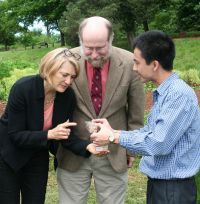
Jefferson's Pursuit of Rice Seeds
No story illustrates Jefferson’s missionary zeal for plant experimentation or his devotion to American economic success better than his lifelong quest for upland rice.
In 1787, Jefferson was serving his country in Paris as Minister to France. He envisioned the new American nation as an agrarian society — a nation of small-scale farmers — and he believed that agricultural exports were a key to America’s lasting success.
Italian Piedmont rice outsold American rice in the Paris markets. Jefferson made a special trip to Lombardy, Italy, to investigate and learned that the Italian grain was a different variety, one that thrived in a dry, upland climate. Seeing an opportunity to introduce a superior variety to America, Jefferson did what anyone would do who believed “the greatest service which can be rendered any country is to add an useful plant to it’s [sic] culture” — he broke the law, essentially committing an act of international espionage. He smuggled samples of the rice out of Italy in his pockets and made arrangements for shipments to be sent to several American plantations.
Several South Carolina rice growers were aggravated by Jefferson’s contraband gifts. One feared the rice would “be the means of propagating an inferior species among us. For that reason I should be glad that you would not send us any more of it.”
Jefferson was undeterred. Convinced that he could both create American economic opportunity and end the “pestiferous culture of the wet rice” which caused high death rates for enslaved workers from malaria and unhealthy working conditions, he inaugurated a global search for samples of dry or upland rice. Jefferson thought that if the rice took off in America it could “save the lives of thousands, and health of tens of thousands annually in South Carolina.”
Later that year, Jefferson became interested in obtaining rice seeds from Vietnam (referred to as Cochin-china at that time). In his letter to William Drayton of South Carolina, Mr. Jefferson wrote, “The dry rice of Cochin-china has the reputation of being whitest to the eye, best flavored to the taste, and most productive. It seems then to unite the good qualities of both the others known to us. Could it supplant them, it would be a great happiness, as it would enable us to get rid of those ponds of stagnant water so fatal to human health and life.”
 In Paris, Jefferson met and shared his idea with a Vietnamese prince, who promised to send seeds to Jefferson. Unfortunately, the prince was unable to keep his promise due to a civil war in his country.
In Paris, Jefferson met and shared his idea with a Vietnamese prince, who promised to send seeds to Jefferson. Unfortunately, the prince was unable to keep his promise due to a civil war in his country.
Some 200 years after Jefferson first inquired about the seeds and on the 20th anniversary of the initiation of diplomatic relations between the U.S. and Vietnam, Viet Nguyen, a University of Virginia alumnus from Hanoi, gifted Monticello with rice seeds from Vietnam. “I presented the seeds to express my personal respect, admiration and gratitude to the ‘Father of the University’ where I studied, and to fulfill Jefferson’s noble wish,” said Mr. Nguyen.
For more on this subject see our article on Rice in the Thomas Jefferson Encyclopedia.



